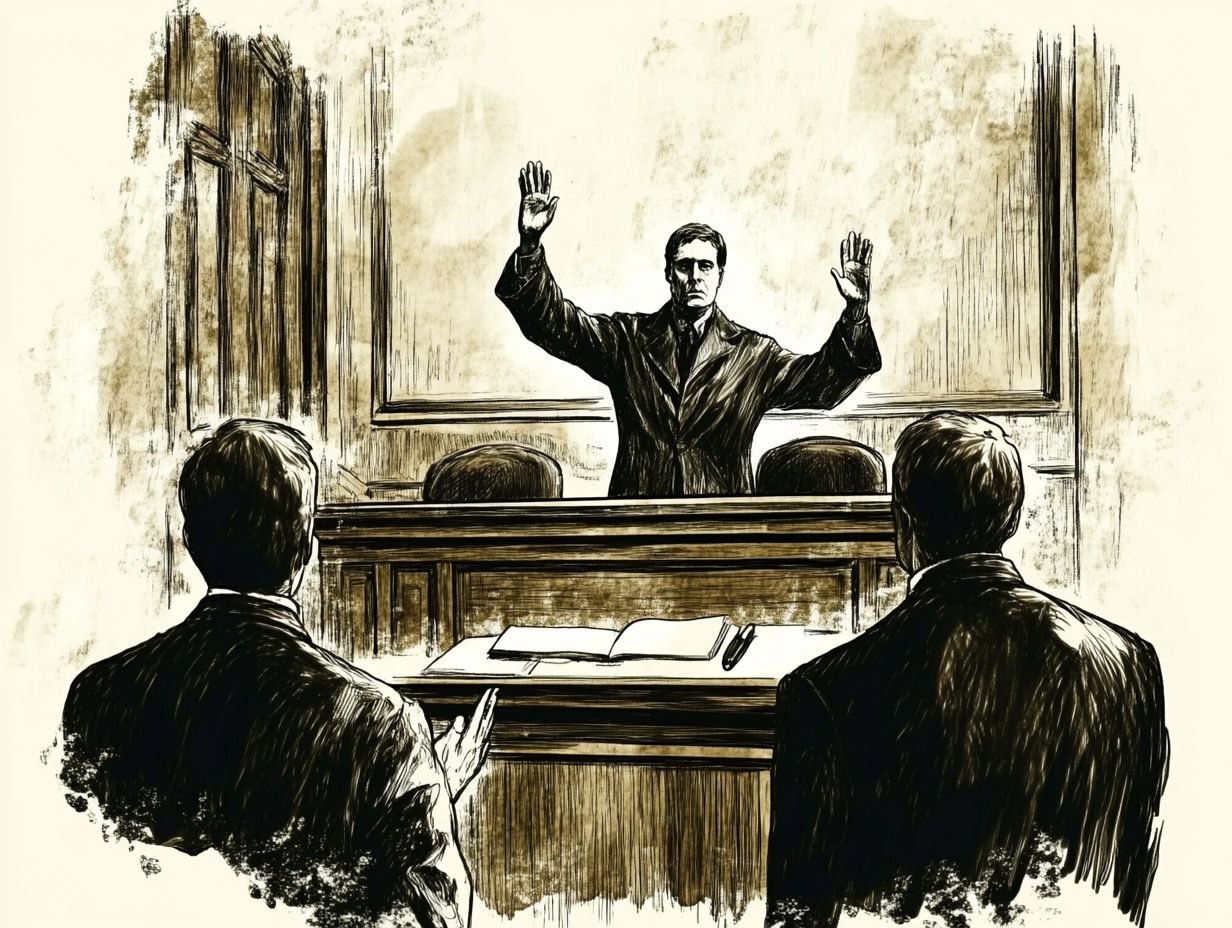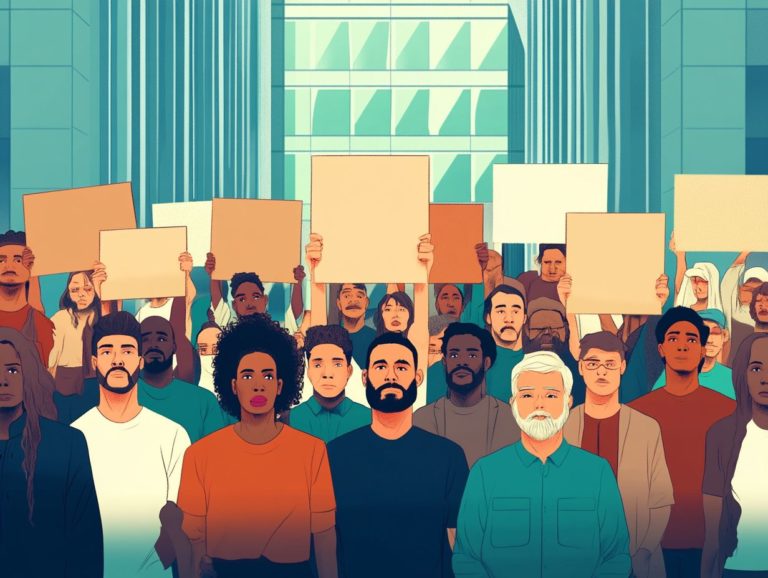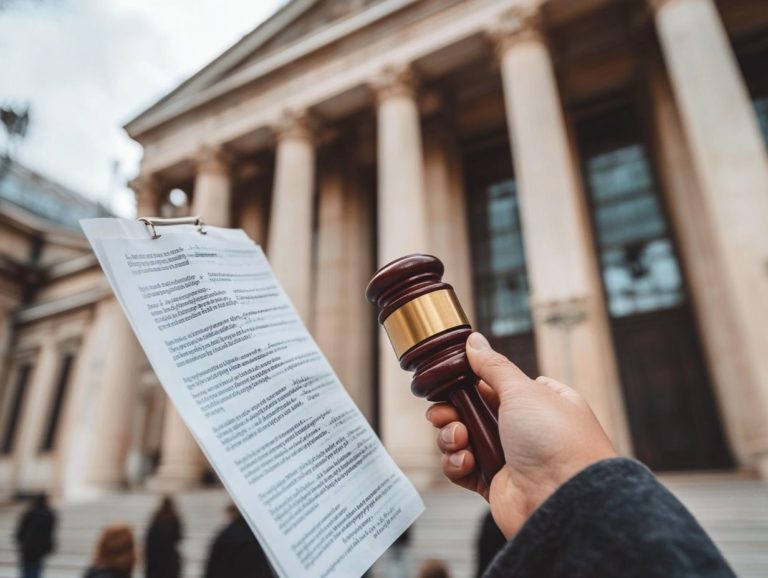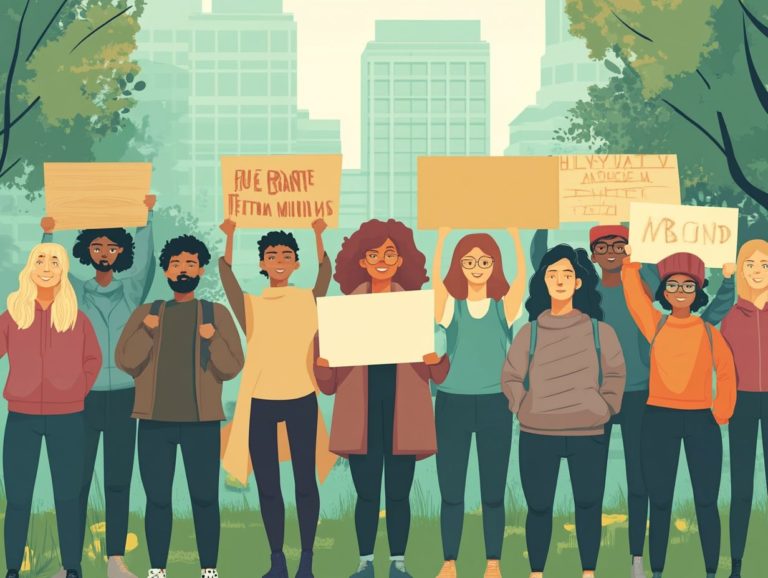The Right to Refuse Incriminating Questions
The Fifth Amendment stands as a cornerstone of American legal rights, empowering you to refuse to self-incriminate.
But when exactly can you exercise this crucial right, and how do you go about asserting it?
In this article, you ll discover the legal foundations of the Fifth Amendment, the situations in which it applies, and practical tips for declining incriminating questions.
We will also examine the potential consequences of exercising this right, discuss exceptions to the rule, and outline essential steps to safeguard yourself.
Understanding these aspects will equip you to navigate legal encounters with confidence and clarity.
Contents
- Key Takeaways:
- The Fifth Amendment and the Right to Refuse Incriminating Questions
- When Can You Exercise this Right?
- How to Refuse Incriminating Questions
- Tips for Protecting Yourself from Self-Incrimination
- Consequences of Refusing to Answer
- Exceptions to the Right to Refuse
- Protecting Your Rights
- Frequently Asked Questions
- What is the right to refuse incriminating questions?
- Why is the right to refuse incriminating questions important?
- Does the right to refuse incriminating questions apply to all situations?
- Can I be punished for exercising my right to refuse incriminating questions?
- Are there any exceptions to the right to refuse incriminating questions?
- What should I do if I am being asked incriminating questions?
Key Takeaways:

You have the right to refuse incriminating questions under the Fifth Amendment of the US Constitution. This right can be exercised in various situations, and it is important to know how to assert it effectively. Refusing to answer incriminating questions may have legal consequences, but there are exceptions and ways to protect your rights.
The Fifth Amendment and the Right to Refuse Incriminating Questions
The Fifth Amendment offers crucial legal protection against self-incrimination. It guarantees that individuals cannot be forced to testify against themselves in legal proceedings, whether in criminal trials or administrative hearings.
This right is vital for protecting your rights in legal situations. It embodies broader constitutional rights outlined in the Bill of Rights, influencing both law enforcement practices and judicial interpretation.
Understanding this privilege against self-incrimination is essential for anyone navigating the intricate landscape of criminal law. It helps ensure fair trials.
Understanding the Legal Basis
The legal foundation for your right to refuse incriminating questions lies firmly within the protections of the Fifth Amendment. This amendment shields you from being forced to provide testimony that could incriminate yourself.
This right is especially important in many legal scenarios. For example, in the landmark case of Miranda v. Arizona, the Supreme Court determined that individuals must be informed of their rights prior to interrogation, emphasizing the importance of voluntary self-incrimination. In Schmerber v. California, the court discussed the complexities of bodily evidence and the limits surrounding compelled testimony.
These cases highlight the intricate nature of the Fifth Amendment, illustrating how its interpretation can shift dramatically based on specific circumstances. Ultimately, this interplay shapes the delicate balance between the interests of law enforcement and the preservation of personal freedoms.
When Can You Exercise this Right?
You have the right to assert your protection against self-incrimination in various legal contexts, particularly during custodial interrogations.
In these situations, where there may be a legitimate fear of criminal prosecution, such legal safeguards become essential.
Situations Where the Right Applies
The right against self-incrimination comes into play in various situations, especially during custodial interrogations when law enforcement seeks witness testimony that could be incriminating.
This essential right protects you from being compelled to provide evidence that could later be used against you in court. For example, during a police interrogation, you might choose to invoke this right to avoid answering questions that could expose your involvement in a crime.
If you decide not to testify during a trial, this choice cannot be interpreted as an admission of guilt. Landmark cases like Miranda v. Arizona reinforce these principles, highlighting the importance of informing individuals about their rights.
In these scenarios, prosecutors play a crucial role. They must carefully balance the pursuit of evidence with respect for constitutional privileges. The invocation of this right underscores the fundamental protections woven into our legal system.
How to Refuse Incriminating Questions

Refusing to answer incriminating questions necessitates a clear invocation of your privilege against self-incrimination. This gives you the power to assert your legal rights with confidence, whether in court or during interrogations.
Tips for Protecting Yourself from Self-Incrimination
To effectively protect yourself from self-incrimination, it s essential to understand the legal landscape, including privilege limitations and the importance of seeking professional legal guidance.
Navigating this complex environment requires awareness of your legal rights and the strategic communication of any reasonable fear you might experience during questioning.
Consider documenting your encounters and pinpointing specific instances that have contributed to your apprehension. Engaging a criminal defense attorney can provide invaluable support; they can help articulate your feelings in a way that aligns with legal standards.
Knowing when to invoke these rights is crucial. Doing so with confidence can influence the outcome in your favor and ensure you are taken seriously.
Consequences of Refusing to Answer
Refusing to answer incriminating questions can lead to serious legal consequences, including the potential impeachment of your testimony in a criminal trial.
This refusal can profoundly impact the overall outcome of legal proceedings, altering the trajectory of your case in unforeseen ways.
Possible Legal Ramifications
The legal ramifications of refusing to answer incriminating questions can significantly affect the credibility of a witness’s testimony and raise questions about privilege in legal proceedings.
Consider the case of Griffin v. California. Here, the defendant’s silence was central, illustrating how refusing to respond can lead to detrimental inferences that may adversely impact the trial’s outcome. If you invoke your Fifth Amendment rights excessively or without solid justification, it could cast doubt on the prosecutor’s case and sway juries against you.
In Cleveland v. State, the court emphasized that a blanket refusal to answer can undermine a defense strategy. This complicates legal maneuvers and could expose you to harsher penalties or accusations of perjury if you contradict previous statements later on.
Exceptions to the Right to Refuse
While the right against self-incrimination is a strong safeguard, there are notable exceptions where individuals may be required to provide testimony.
This is especially true for non-testimonial evidence or under specific circumstances outlined in the exceptions to Miranda rights.
Instances Where the Right Does Not Apply

There are specific situations where the right against self-incrimination doesn t hold up, particularly regarding compelled testimony or the production of non-testimonial evidence as required by law.
For example, law enforcement may demand physical evidence from individuals, such as blood samples or fingerprints; in these cases, that right is often set aside. Court orders can require witnesses to testify when immunity has been granted, effectively lowering their risk of prosecution.
Knowing how these situations connect is crucial for your defense, especially as they involve the Fourth Amendment, which addresses unreasonable searches and seizures. When evidence is collected without a warrant or probable cause, the balance of rights can shift, raising significant questions about privacy and self-incrimination within the justice system.
Protecting Your Rights
Safeguarding your rights against self-incrimination requires a keen understanding of the legal landscape.
Engaging a skilled criminal defense attorney is essential; they can expertly navigate the complexities of invoking privilege on your behalf.
Don t wait reach out to an attorney today to protect your rights!
Steps to Take to Protect Yourself
To protect yourself effectively, it s essential that you understand your legal rights during custodial interrogations. Be prepared to exercise your right to remain silent when the situation calls for it.
This means familiarizing yourself with your Miranda rights, which ensure you are informed of your right to remain silent and to have legal representation by your side.
Before engaging with law enforcement, consulting with a lawyer is advisable. They can provide tailored guidance for your specific circumstances and help outline the best strategies to employ.
If you find yourself confronted by police, confidently asserting your right to counsel and refusing to answer any questions until your attorney is present can significantly influence the outcome of the situation.
Maintaining a calm demeanor, documenting the encounter whenever possible, and understanding the implications of any statements you make will further protect your legal standing.
Frequently Asked Questions
What is the right to refuse incriminating questions?
The right to refuse incriminating questions is a legal principle that allows individuals to decline to answer questions that could potentially implicate them in a crime or violation. This right is protected by the 5th Amendment of the United States Constitution, which safeguards your right not to speak against yourself.
Why is the right to refuse incriminating questions important?

This right is important because it ensures that individuals are not forced to self-incriminate or provide evidence against themselves. It protects their rights and prevents them from being unfairly targeted or prosecuted.
Does the right to refuse incriminating questions apply to all situations?
Yes, the right to refuse incriminating questions applies to all situations, whether in a court of law, during police questioning, or any other scenario where an individual may be asked potentially incriminating questions.
Can I be punished for exercising my right to refuse incriminating questions?
No, you cannot be punished for exercising your right to refuse incriminating questions. It is a constitutional right, and any attempt to punish or coerce an individual for exercising this right would be a violation of their rights.
Are there any exceptions to the right to refuse incriminating questions?
There are some exceptions to this right. For example, if you have been granted immunity, you may be required to answer certain questions. The right may not apply if the information being requested is not self-incriminating.
What should I do if I am being asked incriminating questions?
If you are being asked incriminating questions, assert your rights confidently! You have the right to remain silent and refuse to answer. Calmly and politely assert your right to refuse incriminating questions and seek legal guidance if necessary.






